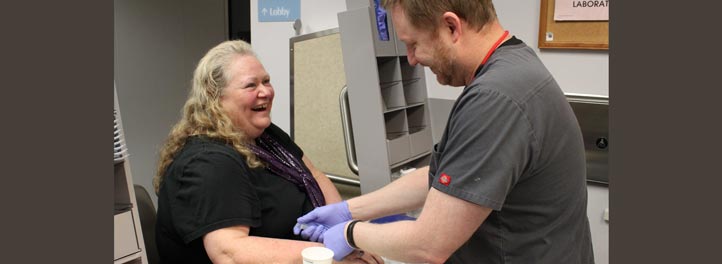National Diabetes Trial Gets Big Boost from KP Center for Health Research
Stories - Jul 13 2016

Photo: A GRADE participant chats with Bryan Kauffman, RN, Clinical Research Specialist.
On the NIDDK’s Glycemia Reduction Approaches in Diabetes study, CHR shines as a top-performing recruitment site
While the last few years have seen a promising decline in the number of newly diagnosed Type 2 diabetes mellitus (T2DM) cases in the United States, the disease remains one of our most widespread public health problems, afflicting about 22 million people. People with T2DM face a host of challenges, including higher risk of long-term complications such as retinopathy, renal failure, cardiovascular disease, and amputation.
To help bring T2DM under control and slow its progression, physicians often prescribe glycemia-lowering medications—starting with metformin, the most commonly prescribed first-line medication for T2DM. But when uncontrolled diabetes persists among patients who are taking metformin, doctors often need to add a secondary drug. And therein lies a problem.
Despite the prevalence of T2DM, surprisingly little is known about which drugs work best in tandem with metformin—and which individual characteristics are associated with the effectiveness of one given drug over another.
Enter the GRADE study: Glycemia Reduction Approaches in Diabetes. Launched by the National Institute of Diabetes and Digestive and Kidney Diseases (NIDDK) in 2013, this large clinical trial aims to compare the long-term effectiveness of four diabetes drugs in combination with metformin.
The NIDDK set a goal of enrolling five thousand patients, which proved to be a challenging bar to reach due to the study’s strict eligibility criteria. To help move the study forward, the NIDDK called upon the Center for Health Research – Northwest, which has a successful track record of recruiting for previous NIDDK studies.
From zero to 150
Kaiser Permanente Northwest joined its counterpart in Georgia as a trial site in 2014, and the Center for Health Research began its recruitment efforts in May 2015, quickly becoming one of the study’s top performers. The study’s executive committee recognized CHR for recruiting its first 50 participants faster than any other site in the trial. The Center has now reached the 100-participant mark and is well on track to reach its goal of recruiting 150 members by April 2017.
“It took a while to get used to the study’s complicated protocol and eligibility criteria, but we’re operating at full speed now,” says Stephen Fortmann, MD, CHR Principal Investigator. “We’re lucky to have great staff and great members who are eager to take part in research. And once again, we’ve made great use of Kaiser Permanente’s electronic medical record system. Our recruiters are able to screen members thoroughly before spending valuable time and resources on outreach.”
Participants who pass their initial screening test enter the study’s run-in phase as they are brought up to a full dose of metformin. Randomization then takes place, and the participants are assigned to one of four study arms. The trial will run through at least 2021.
Big ask, big impact
“We’re asking a lot from our members: multiple visits, injections and blood draws, and a long follow-up period,” says Kathy Arnold, RN, Project Director. “Certainly they’re motivated by the free medications and extra care they’re getting. But they also know they’re contributing to an important research project. In the end, it comes down to the personal relationships between participants and our staff.”
Dr. Fortmann is joined on the GRADE study by two clinical investigators: Harry Glauber, MD, and Karen Mularski, MD. More than a dozen other CHR staff—including nurses, clinical technicians, and project managers—also work on the study. The nurses are key to the study in both recruitment and regular management visits after randomization. They meet with participants to answer questions about the study, review medications and side effects, and offer advice about diet and exercise. Drs. Glauber and Mularski provide advice to the nurses and meet with participants at randomization and when needed thereafter.
“We’re fortunate at Kaiser Permanente to have members that trust us,” says Dr. Glauber. “It’s an easy sell to get them involved in research.”
For Dr. Fortmann, an internist who now focuses exclusively on research, the appeal of GRADE is its potentially transformative clinical impact.
“Right now, patients and doctors alike are often winging it when it comes to diabetes medications,” he says. “This study will bring much-needed clarity to their treatment decisions—and that makes it a great fit for the type of evidence-based medicine we practice at Kaiser Permanente.”